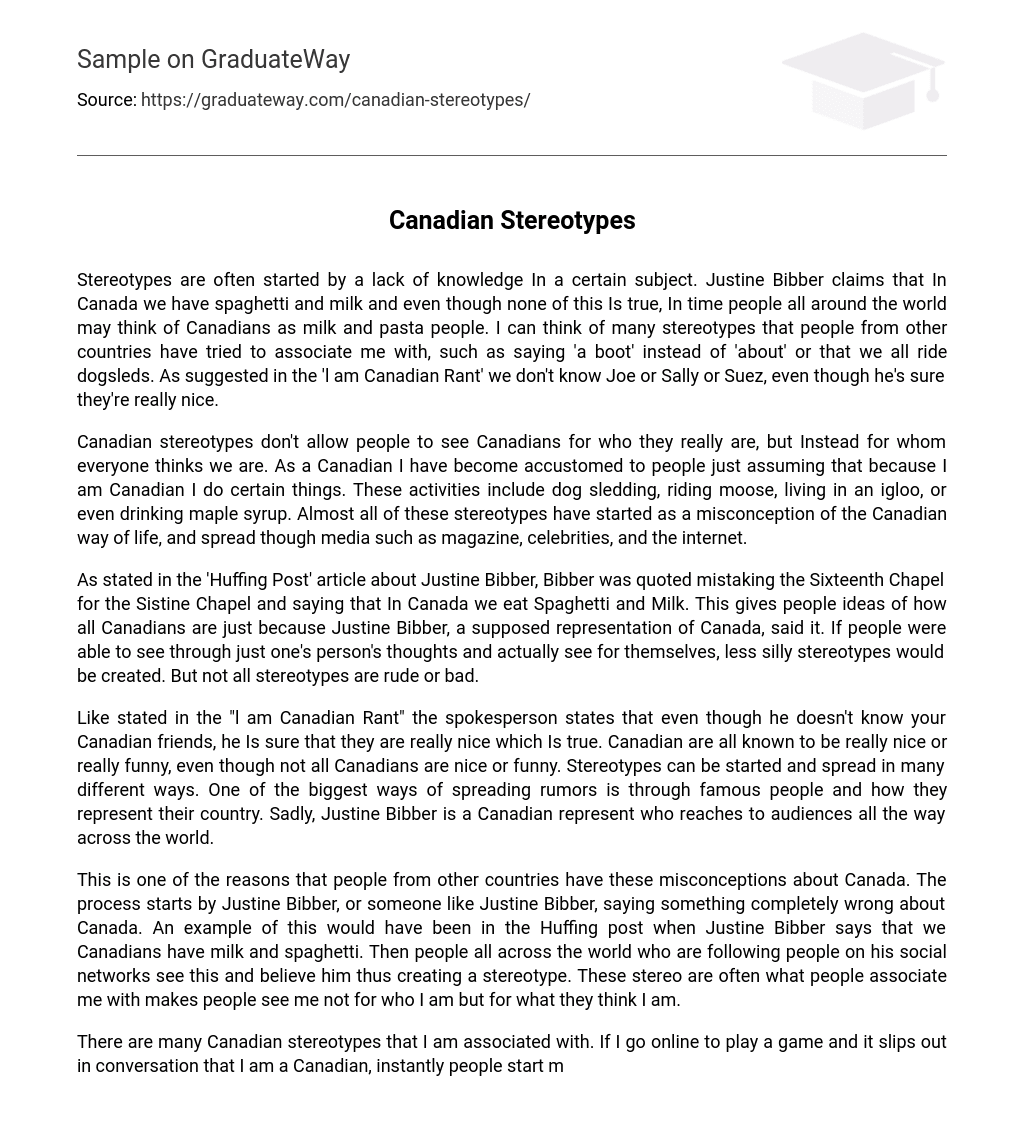Stereotypes often arise from a lack of knowledge in a particular subject. Justine Bibber asserts that in Canada, we consume spaghetti and milk, although this is not true. Over time, people worldwide may begin to associate Canadians with being milk and pasta enthusiasts. Other countries have also attempted to attach various stereotypes to me, such as saying “a boot” instead of “about” or assuming we all use dogsleds. As mentioned in the “I am Canadian Rant,” we are unaware of individuals like Joe, Sally, or Suez, despite believing they are probably friendly.
Canadian stereotypes create a barrier to understanding the authentic identity of Canadians, as they impose predetermined ideas. Being Canadian, I have become accustomed to being automatically associated with certain activities solely based on my nationality. These activities encompass dog sledding, riding moose, dwelling in igloos, and even consuming maple syrup. Many of these stereotypes stem from a misinterpretation of the Canadian lifestyle and persist through different media outlets such as magazines, celebrities, and the internet.
According to an article on the ‘Huffing Post’, Justine Bibber was quoted confusing the Sixteenth Chapel with the Sistine Chapel and claiming that in Canada, we eat Spaghetti and Milk. This can lead to generalizations about all Canadians based on the actions of one person who is seen as a representative of Canada. If individuals were able to look past one person’s beliefs and form their own opinions, fewer unnecessary stereotypes would be formed. However, it is important to note that not all stereotypes are negative or offensive.
According to the “I am Canadian Rant,” the spokesperson affirms that while he may not know all your Canadian friends, he firmly believes that they are genuinely kind, which is undeniably true. Canadians are generally reputed for their exceptional niceness or sense of humor, although not all Canadians possess these traits. Stereotypes can originate and disseminate through various means, and one of the most significant avenues for spreading rumors is through renowned individuals and their portrayal of their respective countries. Regrettably, Justin Bieber, a Canadian representative, has a global reach and influence.
This is one of the reasons why people from other countries have misconceptions about Canada. The process begins with Justine Bibber, or someone similar to Justine Bibber, making completely inaccurate statements about Canada. A prime example of this occurred in the Huffing post when Justine Bibber claimed that Canadians consume milk and spaghetti. Consequently, individuals across the globe who follow him on social media platforms witness these statements and accept them as truth, leading to the formation of stereotypes. These stereotypes often define how people perceive me, causing them to see me not as an individual but as a reflection of their preconceived notions.
Many Canadian stereotypes are associated with me. When I play a game online and mention that I am Canadian, assumptions about my lifestyle and activities start to arise. The “I am Canadian Rant” by the Nelson beer company provides examples of some of the misconceptions or stereotypes that we Canadians are associated with. These include knowing everyone here, eating lard, participating in bobsledding, and saying “A-boot” instead of “about.” These stereotypes, among others, are what define how people perceive me.
Even though these stereotypes are not true for me personally, they still affect how others perceive my identity. These stereotypes shape my sense of self because nobody else can say they “drink maple syrup” or “ride a moose to school,” which are Canadian stereotypes. Advertisements perpetuate these stereotypes and continue to influence my identity. By holding onto these misconceptions about Canadians, people fail to see us for who we really are.
Anywhere, stereotypes can be found and created effortlessly. They have an impact on me and how I am perceived, as seen in the “I am Canadian Rant” and Justin Bieber interview. These stereotypes may label me as a foolish nation due to one person’s errors or associate me with aspects that others might even admire. Yet, these generalizations possess minimal accuracy regarding individuals like myself. Stereotypes act as obstacles obstructing others from perceiving the genuine essence of both myself and others.





